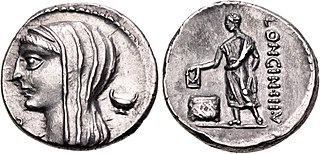
The gens Cassia was a Roman family of great antiquity. The earliest members of this gens appearing in history may have been patrician, but all those appearing in later times were plebeians. The first of the Cassii to obtain the consulship was Spurius Cassius Vecellinus, in 502 BC. He proposed the first agrarian law, for which he was charged with aspiring to make himself king, and put to death by the patrician nobility. The Cassii were amongst the most prominent families of the later Republic, and they frequently held high office, lasting well into imperial times. Among their namesakes are the Via Cassia, the road to Arretium, and the village of Cassianum Hirpinum, originally an estate belonging to one of this family in the country of the Hirpini.
Gaius Trebonius was a military commander and politician of the late Roman Republic, who became suffect consul in 45 BC. He was an associate of Julius Caesar, having served as his legate and having fought on his side during the civil war, and was among the tyrannicides who killed the dictator.

The gens Junia was one of the most celebrated families of ancient Rome. The gens may originally have been patrician, and was already prominent in the last days of the Roman monarchy. Lucius Junius Brutus was the nephew of Lucius Tarquinius Superbus, the seventh and last King of Rome, and on the expulsion of Tarquin in 509 BC, he became one of the first consuls of the Roman Republic.
Gaius Vibius Pansa Caetronianus was consul of the Roman Republic in 43 BC. Although supporting Gaius Julius Caesar during the Civil War, he pushed for the restoration of the Republic upon Caesar’s death. He died of injuries sustained at the Battle of Forum Gallorum.
Gnaeus Cornelius Lentulus Clodianus was a Roman politician and general who was one of two Consuls of the Republic in 72 BC along with Lucius Gellius. Closely linked to the family of Pompey, he is noted for being one of the consular generals who led Roman legions against the slave armies of Spartacus in the Third Servile War.
Lucius Gellius was a Roman politician and general who was one of two Consuls of the Republic in 72 BC along with Gnaeus Cornelius Lentulus Clodianus. A supporter of Pompey, he is noted for being one of the consular generals who led Roman legions against the slave armies of Spartacus in the Third Servile War.
Gaius Caninius Rebilus, a member of the plebeian gens Caninia, was a Roman general and politician. As a reward for devoted service, Julius Caesar appointed him consul suffectus in 45 BC.
Gaius Norbanus Flaccus was a Roman politician and general during the 1st century BC.

The gens Sempronia was one of the most ancient and noble houses of ancient Rome. Although the oldest branch of this gens was patrician, with Aulus Sempronius Atratinus obtaining the consulship in 497 BC, the thirteenth year of the Republic, but from the time of the Samnite Wars onward, most if not all of the Sempronii appearing in history were plebeians. Although the Sempronii were illustrious under the Republic, few of them attained any importance or notice in imperial times.
Lucius Sempronius Atratinus was a Roman politician who was elected suffect consul in 34 BC. He is mentioned in Pro Caelio, a famous speech in defense of Marcus Caelius Rufus by Marcus Tullius Cicero.

The gens Antistia, sometimes written Antestia on coins, was a plebeian family at ancient Rome. The first of the gens to achieve prominence was Sextus Antistius, tribune of the plebs in 422 BC.
The gens Sextia was a plebeian family at ancient Rome, from the time of the early Republic and continuing into imperial times. The most famous member of the gens was Lucius Sextius Lateranus, who as tribune of the plebs from 376 to 367 BC, prevented the election of the annual magistrates, until the passage of the lex Licinia Sextia, otherwise known as the "Licinian Rogations," in the latter year. This law, brought forward by Sextius and his colleague, Gaius Licinius Calvus, opened the consulship to the plebeians, and in the following year Sextius was elected the first plebeian consul. Despite the antiquity of the family, only one other member obtained the consulship during the time of the Republic. Their name occurs more often in the consular fasti under the Empire.
Marcus Junius D. f. M. n. Silanus was a Roman senator and consul in 25 BC as the colleague of Gaius Julius Caesar Octavianus, the emperor Augustus.
Lucius Nonius Asprenas was a Roman politician and general who fought with Julius Caesar and was elected consul suffectus in 36 BC.
Appius Claudius Pulcher was a Roman politician. An early supporter of Augustus, he was elected consul in 38 BC.

Lucius Marcius Philippus was a Roman politician who was elected suffect consul in 38 BC. He was step-brother to the future emperor Augustus.

Lucius Scribonius Libo was a Roman politician and military commander who was consul in 34 BC and brother-in-law to the future emperor Augustus. Libo rose to prominence through his connections with Pompey. When Julius Caesar rebelled against the Roman Senate in 49 BC, Libo sided with Pompey. He carried out a variety of military, diplomatic and naval roles, with mixed success.

Gaius Antistius Vetus was a Roman senator active during the early Roman Empire, and a consul in 6 BC as the colleague of Decimus Laelius Balbus.

Gnaeus Calpurnius Piso was a high ranking Roman aristocrat and senator. He was firmly traditionalist and opposed the populist First Triumvirate, and later Julius Caesar. He fought against Caesar in the Great Roman Civil War and against his adopted son, Octavian, in the War of the Second Triumvirate; both times on the losing side.
Marcus Appuleius was a nephew of the Roman emperor Augustus and Roman consul in 20 BC with Publius Silius Nerva as his colleague.